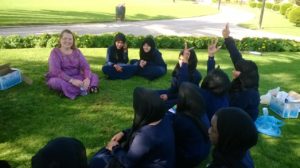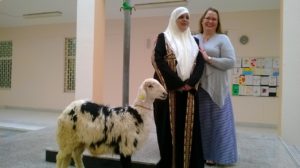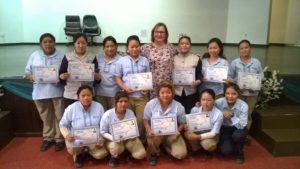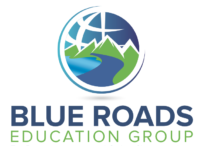This is the second installment in our Changemaker Series centered on conversations with individuals who exemplify the four quadrants of the Blue Roads Changemaker Journey. By asking questions related to the guiding theme for our work, “Homegrown Solutions for a Patchwork World,” we highlight the unique attributes and practices of change-making in the lives of leaders who are making significant contributions to the world we share. Read on for a summary of our interview with Rebecca Counts Kahila or watch the entirety of the conversation here: RCK Interview Link
Introducing Rebecca, Homegrown Changemaker
Rebecca Counts Kahila is co-founder of Blue Roads Education Group. Much of the inspiration for our work in rural communities and schools comes directly from her personal journey as a changemaker in the field of education. Raised in the mountains of rural Virginia, she was exposed to the wonders of the wider world at a surprisingly young age when her father’s work as a coal miner took her family to Algeria when she was 13 years old. Her story is one of continuous learning, perseverance, and growing influence that has taken her from her mother’s rural classroom to her own work as a teacher, principal, and leader re-envisioning possibilities for struggling students at home and abroad.
Meet Homegrown Rebecca
Rebecca was born and raised in Buchanan County, high in the Appalachian Mountains of far southwestern Virginia in the USA. Her large family, including seven siblings, was surrounded by the majesty of the natural environment.
I grew up running the mountains barefoot.
Her father was an intelligent man with a formal education that ended after seventh grade. He made a good living for the family as a hard rock miner providing coal for fuel to the eastern United States and beyond. Her mother was a schoolteacher who taught her own daughter, “Becky” in her third-grade classroom. Rebecca learned from an early age that education is key for everyone’s wellbeing in a healthy society. She also learned that some were able to access that education more readily than others.
Though she was never devalued in her family, the culture encouraged more attention and placed more importance on male children as a rule.
I grew up learning to serve men, take second place, go to the end of the line, and to put the needs of others before myself.
She acknowledges certain value in being raised to care for others. This characteristic is apparent in the motivation she found to become an educator. Rebecca credits her older brother, Randy, who died at the young age of 23, as spurring her in that direction. Randy was the kid who struggled greatly with his studies and could never quite make it or fit in with others in his age group at school. Rebecca now believes that Randy had dyslexia or some other learning disability before the time when these conditions were understood and handled appropriately in schools.
When I became a teacher, I said, I will make sure that kids like Randy feel included.

Solution-focused Rebecca
After graduating from college, Rebecca began her career as an English teacher in Franklin County, Virginia, where she continued to see students with unmet needs like her brother. As a classroom teacher, she put her belief in using data to guide decision-making into regular practice. She studied student performance and observed behavioral trends that concerned her greatly.
I started looking at who’s failing, why are they failing and how am I failing them? …Ultimately as a teacher, I’m the one that’s responsible for providing them with instruction that meets their needs.
As Rebecca analyzed the data, she discovered deficits in reading skills that motivated her to seek alternative ways of teaching. As a self-motivated learner, she studied and developed her capacity to implement content area reading strategies to enable students to digest subject area content more successfully. The resulting success in her classroom did not go unnoticed. She quickly gained recognition as a teacher leader able to provide training for the whole school across grade and subject areas that resulted in schoolwide academic improvements. Her observations and efforts to help all kids succeed motivated her interest in alternatives to typical educational programming. She sought opportunities to hone her skills with determination and an eye toward inspiring others to do the same.
I…went to grad school at Virginia Tech to become an administrator. Again motivated by the idea that we weren’t doing enough for those kids that weren’t in the middle or at the high end of our educational system…we weren’t reaching them…As a building principal I would be sure that those kids were included and had opportunities to learn and achieve and graduate from high school.
Always unsatisfied by the status quo, Rebecca has focused her energies throughout her career on new ways of doing things that showed promise in other settings. She started one of the first computer labs in her district in the 1980’s and developed alternative programs for children with varying needs. At the center of much of her work has been an emphasis on social-emotional learning to teach students how to be self-sufficient and successful in life as well as in school.
We had developed a program that…worked on developing some content skills, some basic skills at the same time as teaching them how to make good decisions, how to be socially responsible, how to say no, how to do, how to say yes, how to ask for what they needed.
As Rebecca moved from rural classroom teacher to urban administrator, she saw previously witnessed student deficits exacerbated by poverty and racial bias.
I realized that a lot of the problems that I had seen were amplified for kids of color and for kids in poverty. They were the kids that were being suspended, and they were the kids in trouble.
With these issues in mind, Rebecca planned educational programs for students living in poverty, belonging to racial minorities, and with special needs. She introduced the kids to technology and built comprehensive systems of support. She focused on developing healthy and positive relationships and teaching self-management skills utilizing student assistance programming for specific students in need and a regular schoolwide advisory program. Perhaps most importantly, she focused on effective instruction for all students in every classroom.
I’ve done a lot of work around effective instruction, and what works in the classroom for all kids (including) differentiation, collaborative learning, cooperative learning, problem-based learning…
But when individual kids needed something different, Rebecca was a strong advocate and creative thinker. She tells the story of one student who had failed a grade in elementary school and by middle school was showing signs of physical maturity that set him apart from his classmates. Rebecca worked with his teachers and family to accelerate his progress in middle school so he could move on to high school and graduate with his age-alike peers.
I’ve always been about all kids but also about each kid. It is different and yet the same. We have to build things that work for each kid and sometimes that’s really special and targeted. But if we can get an approach in place of something that works for all kids then we meet the needs of each kid doing that.
This philosophy eventually led Rebecca to her role as Supervisor of Student Services in Montgomery County, Virginia. In this role, she oversaw several alternative settings that built programs to help kids utilize their strengths and develop new skill sets and find their way back into their home school settings with appropriate supports in place. Her focus on solutions for every child acknowledged that many kids come to school with heavy baggage.
We call it trauma now, but it was just challenges back then. Things that got in their way of being successful that had nothing whatsoever to do with school or their ability to learn.
Rebecca’s Patchwork World
All people are different and unique, of course, but Rebecca’s childhood was spent mostly surrounded by other white families who were supported by men working in the nearby coal mines. Her only exposure to people of color happened when she witnessed incarcerated black men, often disparagingly called the “chain gang”, working along the roadsides in her community.
Ironically, it was coal that provided her first real experiences with cultural diversity up close. Her father’s work moved the family to Algeria for eight months when she was a young teen. You can read her beautiful description of this time in her concluding chapter titled “A Hillbilly Goes to the Middle East” from the book we co-edited titled Cases on Global Competencies for Educational Diplomacy in International Settings (Bizzell, B., Kahila, R.C., Talbot, P., 2016, IGI Global).

The richness of her memories from this time in the Middle East as a child may have been what inspired her to seek an opportunity to work as a principal mentor in a secondary school for girls in the United Arab Emirates later in her career. Already deeply engaged as a leader in equity work in the U.S., Rebecca spent four years working on effective instruction and school climate issues in the context of a gender exclusive and class driven society.
In this context, Rebecca witnessed the vast traditional differences between western schooling and the educational practices in the UAE and learned to navigate the cultural divide with respect and finesse. While she introduced continuity to the school routine in a manner familiar in the west, she was careful to establish behavioral expectations in ways that were applicable and relevant for females in the local Arab culture.
When she returned to the United States, she was ready to work across the Commonwealth of Virginia to address inequities head on and with a broader reach.
Changemaker Rebecca
By the time Rebecca started working for the Virginia Department of Education as a School Safety and Discipline Specialist, she had many years focused on solutions to benefit a wide array of diverse student needs. Every educator creates ripple effects throughout society by way of the students they touch and influence throughout their careers. Rebecca’s teaching, advocacy and leadership at the classroom, school, and district levels as well as her international work in the UAE with students, faculty and school leaders gave her a broad reach to positively effect the lives of hundreds of students. Yet, it is in the context of this new role for the Commonwealth of Virginia, that Rebecca has come into her full capacity as a changemaker. Her current role has broadened her reach exponentially. Although she regrets having less face to face time with students and teachers, by moving to the state policy level with her work for the well-being of all students, she now has the ability to facilitate changes that will benefit hundreds of thousands of students for years to come.
Let me explain.
Rebecca now works with a multi-agency team that includes the Department of Criminal Justice Services, the Department of Juvenile Justice, and the Department of Mental Health Services to address racial and ethnic disparity in school discipline all across Virginia. She provides written guidance and training for school leaders responsible for district implementation of policies that effect kids directly. Her work has focused on building understanding and involvement in the Virginia Tiered Systems of Supports, a data-driven decision-making framework for establishing the academic, behavioral and social-emotional supports needed for a school to be an effective learning environment for all students.
(It’s about) reframing discipline and how we can be equitable and responsive to student needs, whether they’re students coming from trauma or kids who just have a different cultural context and how we can be responsive to those needs in schools.
With the needs of young people as her guide, she led the development of the Model Guidance for Positive and Preventative Code of Student Conduct Policy and Alternatives to Suspension, approved by the Virginia Board of Education in January 2019. The policy guidance reframes school discipline and focuses on creating a safe, supportive school climate within a tiered system of supports.
This document encourages movement toward the infusion of teaching social-emotional skills and looking for where there are deficits in those skills and addressing those deficits rather than just excluding kids who don’t have those skills from the classroom or from the school even.

The themes throughout Rebecca’s professional life have been equity and accessibility to quality education for all kids. She removes barriers, creates inclusive systems, and advocates for change wherever she sees injustice. She is working to realize the United Nations Sustainable Development Goals #4 (Quality Education), #10 (Reduced Inequalities), #16 (Peace, Justice and Strong Institutions and #17 (Partnerships). I am honored to work alongside her in Blue Roads Education Group to celebrate, support and inspire changemakers and invite others to join us on the Journey (See the Changemaker Journey here).
Podcast: Play in new window | Download
Subscribe: Spotify | iHeartRadio | Email | TuneIn | Deezer | RSS | More


